Hugo Weaving is ‘so bored’ with playing macho men
In his role in How to Make Gravy, the star embraces a gentler side: ‘I didn’t want to go to a place where I’m playing yet another cliché caricature of Australian masculinity.’
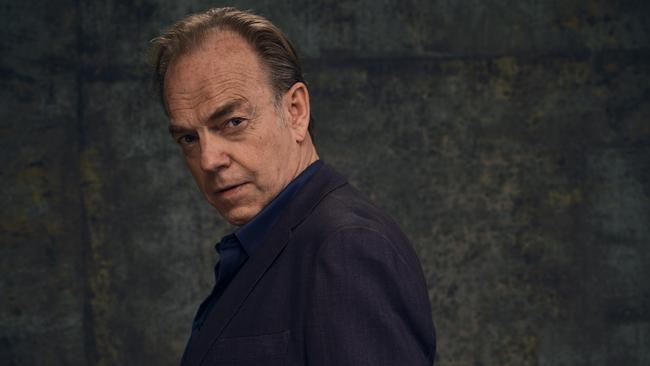
When Review catches up with Hugo Weaving, it’s two hours after our scheduled interview time. The 64-year-old actor has been picking broad beans at his property in Dungog, and the morning got away from him. “I’m really pleased that they’ve come on,” he says, after a generous apology for missing our call. “I haven’t been here for four weeks, I planted them a while ago and they were looking good, but they had terrible aphids on them.”
So what was it that tempted Weaving away from his prize legumes? “I was in England filming another season of Slow Horses.” Aha. So he’ll be back, reprising his role as Frank Harness, the lethal operative introduced in the fourth season of the Apple TV+ spy thriller. The series, which Weaving describes as a “great, well-oiled machine”, spent its early days in a kind of if you know, you know limbo before finally breaking through, earning its first Emmy this year.
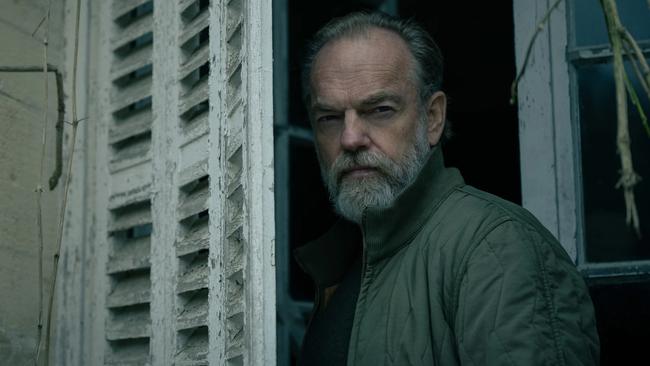
“It’s nice to know that in this day and age, where things get hosed down the drain if they don’t make massive money and an instant mark, that Apple TV+ have maintained their focus on that production,” Weaving says. “Another platform might have said, ‘Oh, we didn’t make heaps of money, let’s dump it’.”
We’re not here to talk Slow Horses, tempting as that may be. We’re here to talk Christmas movies, namely, How to Make Gravy, an adaptation of Paul Kelly’s 1996 jailbird anthem and the first local feature produced by the streamer Binge.
The film, directed by Nick Waterman with a screenplay by ARIA-winning singer-songwriter Megan Washington, expands on Kelly’s tale by giving his banged-up narrator, Joe (Daniel Henshall), a backstory – and a last name: Morris. It’s the 21st of December, and Joe is serving an 18-month sentence for an incident that took place the previous Christmas. That year, adding to the usual holiday frictions, was the recent death of Joe’s mother. Beery cheeriness soon gave way to chaos after a row broke out between Joe and his odious brother-in-law, Roger (the always excellent Damon Herriman). Things turned violent, the police were called, and Joe wound up in cuffs after planting a Liverpool kiss on an arresting officer.
Fast forward a year: Joe’s in the clink, and he’s not having an easy time of it. He’s clashing with other inmates, putting his parole at risk and jeopardising any hope of reuniting with his wife, Rita (Agathe Rouselle, the breakout star of Titane), and their 10-year-old son, Angus (Jona Wren Phillips). His salvation comes in the form of Noel (Weaving), a lifer who offers Joe a safe spot in the kitchen on the condition that he joins his men’s therapy group. Like Paddington Bear with his marmalade, Joe’s gravy becomes a balm for prison infighting, winning over his resident tormentors.
The film has all the genre hallmarks of a Christmas movie: heartfelt festivity tinged with melancholy, painful separations, long-awaited reunions, and, of course, everyone coming good at the end. “The script was a fascinating balance of something that could resonate with most Australians,” says Weaving of his decision to sign on. “It’s not sentimental or soapy. It’s got heart. It’s a real story about real people.”
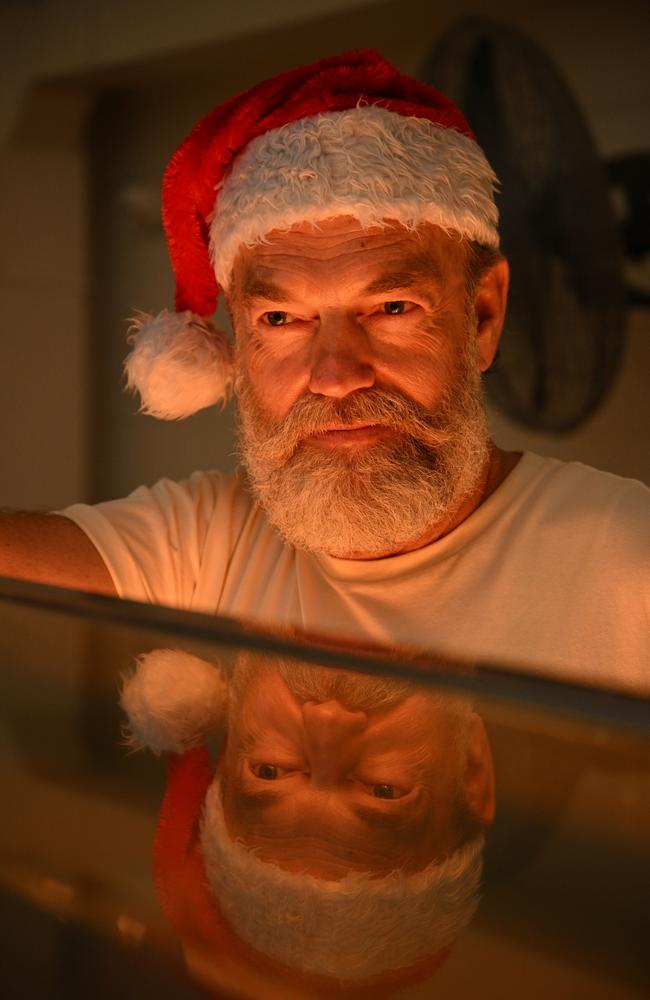
Noel is a far cry from the menacing, creepy roles that have come to define Weaving’s career. He is avuncular, tender, and reformed. A man, Weaving says, who has learned to take responsibility for his life. “It was delightful,” Weaving says of the chance to show his benevolent side. “Really lovely.”
“The thing about Noel is that he’s in there for life – he’s not getting out,” Weaving says when pressed about his character’s past. “So, he’s probably done something terrible. I’d assumed he’d probably killed someone, maybe a friend, over a fight about a woman or something classically macho like that.”
This notion of machismo, and its discontents, is a theme that runs throughout our conversation. “I didn’t want to go to a place where I’m playing yet another cliche caricature of Australian masculinity,” Weaving says. “I’m so bored with all that, to be honest.
“Noel is a fabulous role model for what you can do if you embrace the truth about yourself. If you embrace all the facets of your masculinity, not just the incredibly aggressive ones.”
Does he think that Noel speaks to a culture yearning for masculinity that is less about brute strength and more about emotional openness? “I absolutely do,” he affirms.
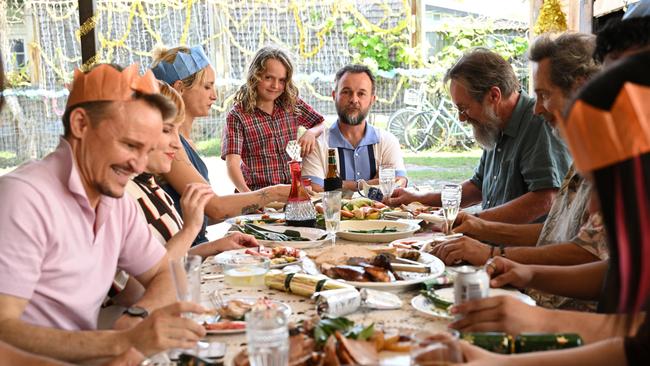
“Look, we’ve just seen Trump re-elected in the States, and a lot of his campaign was about tapping into a disaffected masculine voice, men who feel threatened by a loss of power,” he says. When we speak, it’s the day after the US election. “I think it’s very relevant. A lot of men – though not all – are looking for a way out of what they perceive as a place of impotence.
“Men who embrace their feminine side, or embrace other facets of their masculinity beyond the stereotypical macho role – that’s a successful role model,” Weaving offers. But the cultural pendulum, he warns, may be swinging back.
“Post-#MeToo, I thought we were shifting to a much better place, but I think that’s been quite rapidly overtaken by a reversion back. It feels like we’re sliding back into that macho strongman ideal, unfortunately.”
Weaving previously told this masthead that Paul Kelly’s song was written at a time when culture was more liberated, compared to the present which feels more politically restricted and censorious. Has he noticed that shift reflected on screen? “That’s a complicated one,” he pauses for thought. “I still go to film festivals and watch films on the big screen. I love that part of film culture. But I think that’s happening less and less.
“More and more, we’re taking in visual information on our devices, so we’re experiencing things in fragments. We’re feeding our own echo chambers, watching what algorithms tell us we want to see. We’re not challenging ourselves to think differently or explore different cultures and expressions of what it is to be a human being – which you’d certainly get at a film festival.”
He says he no longer watches mainstream American films. “I can’t bear it. These macho bullshit movies,” he laughs. “My tastes would always be to stay at the ‘school of life’. A film that teaches me something about other people is a film I’m interested in.”
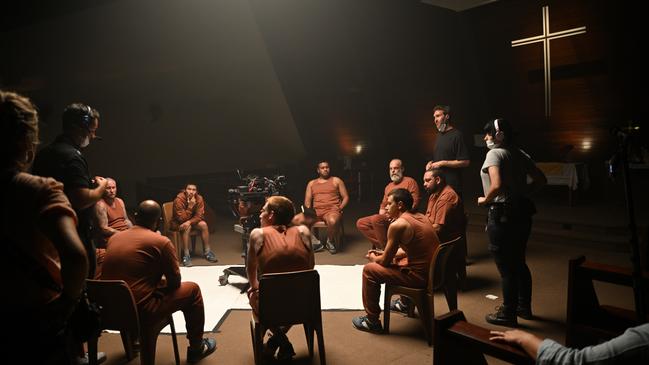
Weaving speaks of his experience working with Waterman, a first-time feature director, with clear admiration. “Nick and Megan created such a calm, sane, creative environment. They wrote a beautiful script, and they were both fantastic to work with. It was a joy for me.”
For him, the film’s success lies in its ability to balance “art-house filmmaking” and a mainstream narrative about family and the complex emotions that come with the festive season.
“Nick’s got a more human sensibility to him. He gives things time,” Weaving says of Waterman’s directing style. “You don’t feel as if you’re being rushed and pushed. You’re allowed to breathe with the characters and feel like they’re real.”
As for Megan Washington’s contributions, Weaving is equally effusive. “Megan’s music really elevates the piece emotionally without pulling heartstrings in an obvious way.”
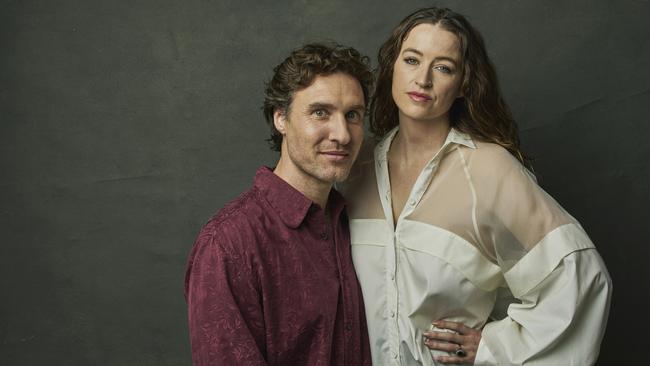
As well as writing the screenplay, Washington penned two original songs for the film. “The feelings that come out of you when you’re watching and listening to the music – my God! Those scenes in the prison choir are very powerful,” Weaving says, referring to an interlude that acts as a kind of Where’s Wally? for the local music scene, featuring artists such as Brendan Maclean, Zaachariaha Fielding from this year’s Eurovision entry Electric Fields, and the Yorta Yorta rapper Adam Briggs. “We were in costume, listening to the songs they were singing live. You could feel the emotional weight of being stuck in prison during the holidays.
“Megan did an incredible job of translating her emotions into the music. It had such a profound impact on the film.
As our conversation winds down, Weaving returns, once more, to his beans. “They don’t need much,” he offers. “Just a little bit of lemon, olive oil and salt.”
In that moment, he sounds, perhaps fittingly, a bit like Paul Kelly himself.
How to Make Gravy is streaming now on Binge.

